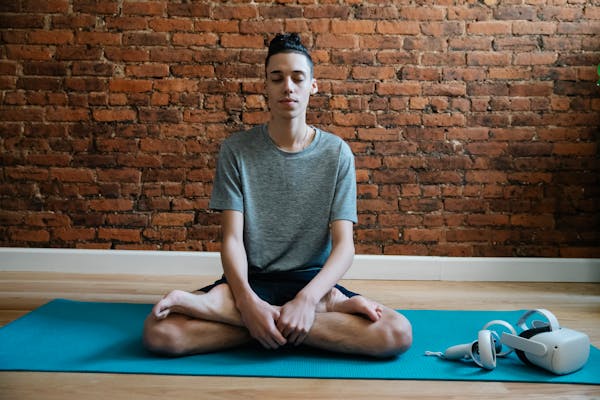Table of Contents
Mental Health Benefits of Yoga In today’s fast-paced world full of challenges and uncertainties, taking care of mental health has become more important than ever. With its long history of aligning the body, mind, and spirit, yoga has become a powerful tool to achieve mental well-being. This blog looks into the deep mental health benefits of yoga, from stress, anxiety, focus, and emotional stability.

Introduction
Yoga is not a physical exercise alone; it is a holistic practice that integrates movement, breath, and mindfulness. This ancient Indian practice has gained global recognition for its ability to enhance both physical and mental health. At a time when stress, anxiety, and depression are on the rise, mental health yoga provides a natural and accessible solution to achieve inner peace and well-being.
Connection Between Yoga and Mental Health
Yoga has an indirect impact on mental health because it promotes a deep involvement of the mind with the body. Mindful breathing, stretches, and meditation can encourage the release of stress and cultivate mental clarity.
Scientific studies have shown that yoga lowers the levels of cortisol, which is the primary hormone of stress, and increases serotonin, a neurotransmitter that helps elevate mood. This is the reason why mental health yoga can improve emotional balance and resilience if practiced regularly.
An element of yoga which greatly goes in with mental well-being, through practicing being a creature in this moment, decreases overthought as the anxiety and thus leads one into a calm position. All these make a practice where one is brought together at that mind-body.
Key Mental Health Benefits of Yoga-Stress Reducing
Yoga activates the parasympathetic nervous system, or the “rest and digest” system. It calms the heart and reduces tension through breathing techniques such as Pranayama. Child’s Pose and Savasana are some of the best poses to relax the body and release tension.
Anxiety Management
The root cause of anxiety is usually an overactive mind and lack of being present. Techniques in yoga, such as slow breathing and meditation, help regulate the nervous system, thus reducing symptoms of anxiety. Regular practice of mental health yoga builds up the resistance to anxiety triggers.
Enhanced Concentration and Focus
Yoga is about mindful movement and breath control, which helps the individual focus more. For example, the Tree Pose needs balance and concentration, and through time, it conditions the mind to stay present. Through time, mindfulness increases productivity and mental clarity.
Emotional Stability
The practice of yoga teaches acceptance of emotions without judgment, thus making an individual emotionally resilient. The techniques used in mental health yoga, such as chanting and meditation, help regulate emotions, leading to a better outlook in life.
Better Sleep
Mostly insomnia and sleep disorders are ascribable to pressure or anxious nature. Restorative poses and Yoga put one’s mind into repose while readying the body to go to bed sleep peacefully. Practice mental health Yoga in bed is the great antidote for insomnia or a cure of restlessness in sleep.

Poses which enhance and alter mind status:
There are yoga poses which directly or indirectly are going to help manage one’s mental status about pressure or anxiety. So here are some:
Child’s Pose (Balasana): This mild forward bend calms the mind and soothes tension in the back and shoulders.
Bridge Pose (Setu Bandhasana): This pose opens the chest and reduces fatigue. It creates a feeling of rejuvenation.
Tree Pose (Vrikshasana): Improves focus and mental balance by developing balance.
Corpse Pose (Savasana): It is a profound relaxation and mental clarity posture. It is perfect after a hectic day.
These can be incorporated into a daily routine very easily and are an effective way to practice mental health yoga.
Meditation in Mental Health
Meditation is the most important core of yoga, and its mental benefits are enhanced. Meditation helps bring more awareness about one’s thoughts and makes one’s thinking less negative. Guided meditations in mental health yoga are mainly about breathing and visualizing a state of inner peace.
Practicing yoga with meditation doubles the effect, making it a great combination for mental well-being. Whether it’s a quick 5-minute session or a long practice, meditation builds up mindfulness and emotional stability.
Tips for Yoga in Daily Life
Beginning a yoga practice can be easy and rewarding. Here are some tips:
Start with Basic Poses: Start with simple poses such as Child’s Pose or Cat-Cow Pose for easy transition.
Set a Routine: Spend 10–15 minutes every day on yoga. It is best done in the morning to clear the mind.
Guided Classes: Find classes or online tutorials to learn the right techniques for mental health yoga.
Combine Yoga and Meditation: Have a short meditation session before or after your yoga session for more benefits to your mental health.
Long-term Impact of Mental Health Yoga
Although immediate gains like stress relief and better concentration are noticeable, long-term yoga practice brings more profound, lasting mental health benefits:
Building Resilience
Yoga teaches the mind to respond to challenges. Through developing mindfulness and emotional intelligence, regular practitioners of mental health yoga develop resilience to the ups and downs of life.
Improved Self-Awareness
The introspective nature of yoga encourages a certain amount of self-reflection. Such reflection helps recognize what makes individuals emotional. Over time, this amounts to more healthier coping.
Decreasing Chronic Mental Conditions Symptoms
In patients that have depression, PTSD, ADHD, for instance, a complementary therapy is yoga. Through the above studies, one finds a reduction in symptoms through constant practice of the yoga regime that enhances a better quality of life in general.
Healthier Mind and Body Cohesion
As yoga strengthens the bonds between the mind and body, the individual experiences a sense of wholeness. Wholeness translates into living life in a calmer more balanced way.

Overcoming Obstacles to Practicing Yoga
Since yoga has so many potential benefits, it is surprising that many folks face obstacles when trying to incorporate yoga into their busy lives. Here’s how some common obstacles can be overcomed:
Time Constraints: Short on time? Start with just 5–10 minutes a day. Simple sequences or a few minutes of meditation can still provide noticeable benefits.
Lack of Motivation: Pair up with a friend or join a yoga class for accountability. Alternatively, use apps that provide daily reminders and guided sessions.
Physical Limitations: Yoga is adaptable. Chair yoga or gentle yoga sessions are perfect for individuals with limited mobility.
Mental Health Yoga for Children and Teens
Yoga is not just the benefits of adults. Children and teens also can benefit with mental health yoga, given that they are going through much pressure due to academics and social interactions and stress from screens.
Improved Emotion Regulation: Yoga helps young minds recognize and manage emotions much better.
Improved Focus and Academic Performance: Yoga practices increase mindfulness, allowing concentration that leads to improvement in academics.
Less Behavioral Problems: This is because frequent yoga practice helps calm down children, making less prone to outbursts and fights.
Early life yoga helps establish a strong core for life long mental welfare.
The Science of Mental Health Yoga
Yoga is scientifically verified. Here are some of the ways whereby yoga works for mental wellbeing:
Neurotransmitter Modulation: The practice causes an increase in GABA, which is a neurotransmitter that causes relaxation and reduction of anxiety.
Neuroplasticity: Yoga practice helps a person to be more adaptable to situations by making the brain flexible.
Reduction of Stress Hormone: The regular practice reduces the level of cortisol that causes chronic stress and mental illness.
Heart Rate Variability (HRV): Yoga increases HRV, which is an indicator of the body’s ability to manage stress.
Global Perspective on Mental Health Yoga
Yoga has transcended its cultural roots and become a global phenomenon, with each region adapting it to its unique needs:
Western Countries: Focus on yoga as a stress-relief and fitness tool. Mental health yoga is commonly integrated into workplace wellness programs.
Eastern Countries: Yoga remains a spiritual and holistic practice, emphasizing mindfulness and mental peace.
Corporate Environments: Companies worldwide now recognize yoga’s role in reducing burnout and boosting productivity.
These differences demonstrate the cross-culture appeal and flexibility of yoga in mental health.
Yoga as a Group Activity
Yoga performed in a group environment promotes mental health through increased community and social cohesion. The group setting provides an atmosphere of mutual support and shared experiences.
This community aspect of mental health yoga helps eliminate feelings of loneliness and isolation, which have been commonly associated with mental health disorders.
Beyond the Mat: The Yoga Lifestyle
Yoga goes beyond physical postures and breathing exercises. Living life according to the principles of yoga can add even more benefits to mental health:
Ahimsa (Non-violence): Be kind to yourself and others.
Satya (Truthfulness): Be true to your thoughts and actions.
Santosha (Contentment): Learn to appreciate life and look at the bright side.
Living according to these principles will help you reach mental clarity and inner peace.

Conclusion
The mental health benefits of yoga are profound and far-reaching. By reducing stress, managing anxiety, enhancing focus, and fostering emotional stability, yoga offers a holistic approach to mental well-being.
Incorporating yoga into your daily life doesn’t require drastic changes—just a commitment to prioritize your mental health. Whether you’re new to yoga or an experienced practitioner, exploring the practice of mental health yoga can lead you on a path to inner peace and well-being.
Take the first step today. Unroll your mat, take a deep breath, and let yoga transform your mind, body, and spirit.
